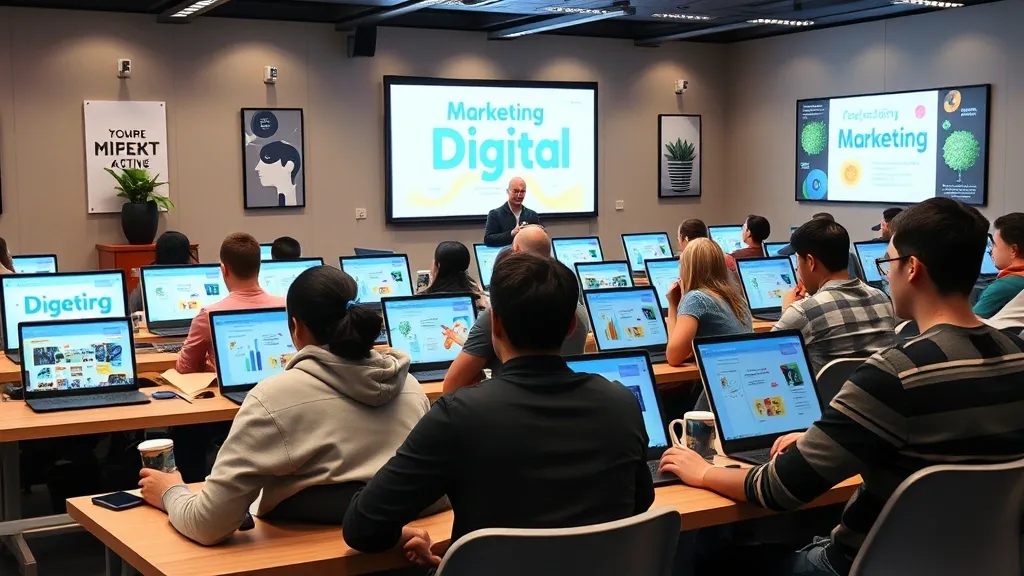Introduction to Digital Marketing Courses
In today’s fast-paced digital landscape, the importance of digital marketing cannot be overstated. As businesses increasingly transition to online platforms, the demand for skilled digital marketers continues to rise. Whether you are a seasoned marketing professional looking to update your skills or a newcomer seeking to enter the field, digital marketing courses offer valuable insights and practical skills that can propel your career forward.
Digital marketing encompasses a wide range of strategies and tools designed to engage consumers through various online channels. From social media marketing and search engine optimization (SEO) to content marketing and email campaigns, the scope of digital marketing is vast. As such, choosing the right course can be a daunting task. It is essential to identify your career goals and the specific skills you wish to acquire, as this will guide your selection process.
Many digital marketing courses are available, ranging from short workshops to in-depth programs offered by universities. These courses often include a blend of theoretical knowledge and hands-on experience, ensuring that students not only learn the concepts but also apply them in real-world situations. Here are some of the key areas you can expect to cover in a digital marketing course:
- Search Engine Optimization (SEO): Learn how to optimize websites to rank higher in search engine results, driving organic traffic.
- Content Marketing: Understand how to create compelling content that attracts and retains customers.
- Social Media Marketing: Explore strategies for building brand awareness and engagement through various social media platforms.
- Email Marketing: Discover how to design effective email campaigns that nurture leads and convert prospects into customers.
- Data Analytics: Gain insights into how to track and analyze marketing performance to inform future strategies.
As you consider your options, remember that the right course should align with your professional aspirations, learning style, and schedule. Many institutions offer online formats, allowing for greater flexibility and accessibility. By investing in your education through digital marketing courses, you position yourself as a valuable asset in a competitive job market, equipped with the skills needed to drive successful marketing campaigns in the digital age.
Types of Digital Marketing Courses
Choosing the right digital marketing course can be a daunting task given the vast array of options available. Understanding the different types of courses can help streamline your decision-making process and align your educational pursuits with your career goals. Below are some of the most common types of digital marketing courses you might consider:
- Comprehensive Digital Marketing Courses: These courses cover a wide range of topics within digital marketing, including SEO, PPC, social media marketing, email marketing, and content marketing. They are ideal for individuals looking to gain a holistic understanding of the field.
- Specialized Courses: If you already have a foundational knowledge of digital marketing, specialized courses focus on specific areas such as search engine optimization (SEO), pay-per-click advertising (PPC), social media strategy, or content marketing. These courses are designed for those who want to deepen their expertise in a particular niche.
- Certification Programs: Many institutions offer certification programs that provide credentials upon completion. These programs often include a mix of theoretical knowledge and practical application, making them suitable for both beginners and professionals seeking to validate their skills.
- Short Courses and Workshops: For those with limited time, short courses or workshops can deliver concentrated insights into particular aspects of digital marketing. These are often intensive and can range from a few hours to a couple of days.
- Online Courses: With the rise of e-learning, many reputable institutions and platforms offer online digital marketing courses. These courses provide flexibility and can be accessed from anywhere, making them ideal for busy professionals or those who prefer self-paced learning.
- Degree Programs: For those looking to pursue a formal education in digital marketing, degree programs, such as a Bachelor’s or Master’s in Marketing with a focus on digital strategies, can provide an in-depth understanding and robust academic foundation.
When selecting a digital marketing course, consider your current skill level, career aspirations, and the specific areas of digital marketing you wish to explore. Each type of course offers unique benefits, so take the time to research and choose one that aligns with your professional development goals.
Factors to Consider When Choosing a Course
When selecting a digital marketing course, it is crucial to consider various factors that align with your career goals and learning preferences. The right course can significantly impact your knowledge acquisition and professional development. Here are the key factors to keep in mind:
- Course Content: Review the syllabus and ensure it covers essential topics such as SEO, PPC, social media marketing, email marketing, and analytics. A comprehensive curriculum will provide you with a well-rounded understanding of digital marketing.
- Instructor Expertise: Investigate the background of the instructors. Look for professionals with substantial industry experience and a proven track record in digital marketing. Their insights can offer invaluable real-world applications of the concepts taught.
- Learning Format: Consider whether you prefer online, in-person, or hybrid learning formats. Online courses offer flexibility, while in-person classes can provide networking opportunities and hands-on experience.
- Duration and Intensity: Evaluate the course duration and the intensity of the program. Depending on your schedule, you might prefer a short, intensive course or a longer program that allows you to digest the material more thoroughly.
- Certifications and Recognition: Verify if the course provides a certification upon completion and whether it is recognized in the industry. Accredited courses can enhance your resume and credibility as a digital marketer.
- Student Support and Resources: Check if the course offers additional resources such as mentorship, access to industry tools, and networking opportunities. These resources can significantly enhance your learning experience.
- Reviews and Testimonials: Look for reviews or testimonials from past students. This feedback can provide insight into the effectiveness of the course and the experiences of others who have taken it.
- Cost and Value: Consider the course fees in relation to the value it offers. While a higher price does not always guarantee better quality, investing in a reputable course can yield significant returns in your career.
By carefully evaluating these factors, you can make an informed decision about which digital marketing course is the best fit for your aspirations and learning style. Taking the time to research and reflect on these elements will empower you to advance your career in the digital marketing landscape effectively.
Conclusion and Recommendations
Choosing the right digital marketing course is a crucial step towards enhancing your skills and advancing your career in the ever-evolving field of digital marketing. Given the diverse range of courses available, it is essential to consider various factors that align with your personal and professional goals.
First and foremost, identify your specific interests within digital marketing. Whether you are drawn to SEO, content marketing, social media, or data analytics, knowing your passion will guide you in selecting a course that offers in-depth knowledge in that area. Additionally, take stock of your current skill level. Beginners may benefit from foundational courses that provide a broad overview, while more experienced professionals might seek advanced programs that delve into specialized topics.
Furthermore, consider the format and duration of the course. Online courses offer flexibility that can accommodate your schedule, while in-person classes might provide valuable networking opportunities and real-time interaction with instructors. Make sure to evaluate the course length and structure to ensure it fits within your time constraints and learning preferences.
Another critical aspect is the credibility of the institution offering the course. Look for programs with industry recognition and positive reviews from former students. Accreditation and partnerships with reputable organizations can also enhance the value of the course you choose.
To summarize, here are some recommendations when selecting a digital marketing course:
- Define Your Goals: Clearly outline what you hope to achieve through the course.
- Research Course Options: Compare various programs, focusing on curriculum, delivery method, and duration.
- Check Reviews and Accreditation: Look for feedback from past participants and ensure the course is recognized in the industry.
- Network with Peers: Engage with others in the field to gain insights and recommendations on effective courses.
- Stay Updated: The digital marketing landscape is constantly changing, so choose a course that emphasizes current trends and technologies.
By taking these factors into account, you will be better positioned to select a digital marketing course that not only enhances your knowledge but also propels your career forward. Remember, investing in your education is investing in your future.

